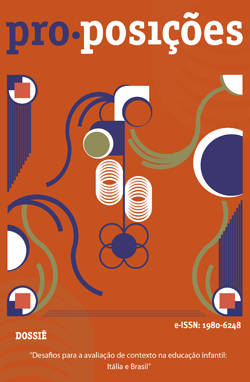Abstract
Inspired by Elizabeth Povinelli’s essay Geontologies: a requiem to late liberalism, this paper problematizes the current conditions of neoliberal governance, through an expansion of the Foucaultian concept of biopolitics. The intention is to rethink the educational processes on the margins of biontology deployed by the entrance into the Anthropocene to disable the imaginary of carbon. This is a speculative essay organized in two axes. First, the paper reflects the conditions under which certain populations and, more specifically, certain bodies suffer from differential exposure to injustice, violence and death. Then, discuss the possibility of activating other ways of life capable of resisting the neoliberal arts of government. In the limit, the purpose is to indicate some reasons why the pedagogical field has inflated the issue of education as a selfenterprise and deflated the concern with self-care and care of the others, defending an opening of educational theories to other figures and subjects of education as part of a powerful criticism of the excesses caused by the imaginary of carbon in our systems of thought.
References
Binkley, S. (2009). The work of neoliberal governamentality: temporality and ethical substance in the tale of two dads. Foucault Studies, (6), 60-78.
Butler, J. (2003). Problemas de gênero: feminismo e subversão da identidade. Rio de Janeiro: Civilização Brasileira.
Butler, J. (2011). Vida precária. Contemporânea, 1(1), 13-33.
Canguilhem, G. (2012). O conhecimento da vida. Rio de Janeiro: Forense Universitária.
Comitê Invisível. (2016). Aos nossos amigos: crise e insurreição. São Paulo: n-1 edições.
Costa, A. C. (2016). Virada geo(nto)lógica: reflexões sobre vida e não-vida no Antropoceno. Analógos, 1, 140-150.
Danowski, D., Viveiros de Castro, E. (2014). Há mundo por vir? Ensaio sobre os medos e os fins. Florianópolis: Cultura e Barbárie.
De Genova, N. (2015). As políticas queer de migração: reflexões sobre ilegalidade e incorrigibilidade. Revista Interdisciplinar Mobilidades Humanas, 23(45), 43-75.
Deleuze, G., Guattari, F. (1995). Mil platôs: capitalismo e esquizofrenia 2. São Paulo: Editora 34.
Foucault, M. (2006). Estratégia, poder-saber (2a ed.). Rio de Janeiro: Forense Universitária.
Foucault, M. (2008). Segurança, território, população. São Paulo: Martins Fontes.
Freitas, A. S. (2017). As lições perigosas do professor Foucault. Bagoas: Estudos gays: Gêneros e Sexualidades, 11(16), 50-78.
Haraway, D. (2016). Antropoceno, capitaloceno, plantacionoceno, chthuluceno: generando relaciones de parentesco. Revista Latinoamericada de Estudios Críticos Animales, 3(1), 15-26.
Kopenawa, D., Albert, B. (2015). A queda do céu: palavras de um xamã yanomami. São Paulo: Companhia das Letras.
Koyama, E. (2003). The transfeminist manifesto. In R. Dicker, & A. Piepmeier (Eds.), Catching a wave: reclaiming feminism for the 21st century (pp. 244-259). Boston: Northeastern University Press.
Latour, B. (2013). Investigación sobre los modos de existencia. Buenos Aires: Paidós.
Mbembe, A. (2014). Crítica da razão negra. Lisboa: Antígona.
Mbembe, A. (2016). Necropolítica. Arte & Ensaios, (32), 123-151.
Moore, J. (2015). Capitalism in the web of life. New York: Verso.
Negri, A. (2016). Quando e como eu li Foucault. São Paulo: n-1 edições.
Povinelli, E. A. (2001). Radical worlds: the anthropology of incommensurability and inconceivability. Annual Review of Anthropology, 30, 319-334.
Povinelli, E. A. (2013). As quatro figuras da sexualidade nos colonialismos de povoamento. Cadernos Pagu, (41), 11-18.
Povinelli, E. A. (2016). Geontologies: a requiem to late liberalism. London: Duke University Press.
Preciado, B. (2008). Testo yonqui. Madrid: Espasa.
Preciado, B. (2011). Multidões queer: notas para uma política dos anormais. Estudos Feministas, 19(1), 11-20.
Romandini, F. L. (2013). H. P. Lovecraft: a disjunção do ser. Florianópolis: Cultura e Bárbarie.
Safatle, V. (2017). Governar é fazer desaparecer. Cult. Recuperado de https://revistacult.uol.com.br/home/vladimir-safatle-governar-e-fazer-desaparecer/.
Serano, J. (2007). Whipping girl: a transsexual woman on sexism and the scapegoating of femininity. Berkeley: Seal Press.
Sloterdijk, P. (2012). Has de cambiar tu vida: sobre antropotécnica. Valencia: Pre-Textos.
Stengers. I. (2015). No tempo das catástrofes. São Paulo: Cosac Naify.
Teixeira, M. A. A. (2015). Metronormatividades nativas: migrações homossexuais e espaços urbanos no Brasil. Áskesis, 4(1), 23-38.
Valentim, M. A. (2014). A sobrenatureza da catástrofe. Revista Landa, 3(1), 3-25.
Vieira, P. J. (2011). Mobilidades, migrações e orientações sexuais: percursos em torno das fronteiras reais e imaginárias. Ex Æquo, (24), 45-59.
Viveiros de Castro, E. (2012). Transformação na antropologia, transformação da antropologia. Mana, 18(1), 151-171.
Viveiros de Castro, E. (2015). Metafísicas canibais. São Paulo: Cosac Naify.
A Proposições utiliza a licença do Creative Commons (CC), preservando assim, a integridade dos artigos em ambiente de acesso aberto.


